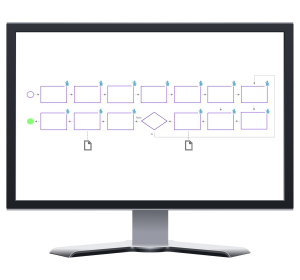Physical robots have already revolutionized the factory floor. Now software robots are changing everything else in the manufacturing industry. Find out what opportunities automation has in store for the manufacturing industry.
Gain breakthrough benefits through automation and drive your business to a new level of efficiency, productivity and competitiveness.
About 35%
Lower operating costs
About 85%
Faster market launch
Up to 200%
Higher factory output
Global Lighthouse Network (McKinsey & World Economic Forum)
In today's fast-paced world, customers expect fast and efficient processes from manufacturing companies. By using intelligent automation technologies, manufacturers can meet these expectations and optimize their own business processes at the same time.
Reduce costs
By automating processes with RPA, companies can reduce labor costs as less manual intervention is required. This can have a significant impact on cost efficiency, especially for labor-intensive and time-consuming tasks such as data entry, inventory control or invoice verification.
Improved supply chain management
RPA can help increase the transparency and efficiency of supply chains by enabling the automated processing of supplier data, purchase orders and invoices. This can lead to faster response times to customer requests, improved inventory tracking and better collaboration between suppliers and manufacturers.
Greater customer involvement
By automating marketing, sales and retail services, customers can be better supported. This leads to an improvement in the quality and responsiveness of customer service and maintenance across the organization. Automation makes customer interactions more efficient and enables a faster and more accurate response to customer queries and needs.
Strengthen employees
By using digital desktop assistants, routine tasks are automated, freeing up time and resources to focus on strategic tasks and higher-value activities. This increases the efficiency and productivity of employees and enables them to reach their full potential.

Use case manufacturing industry
Automatic processing of order confirmations
Automatic processing of order confirmations
Read how we have automated the processing of order confirmations for our customers:
- Sector: Manufacturing industry
- Department: Purchasing, supplier management
- Automated systems: ERP systems, Office applications
- Technology used: RPA, UiPath Document Understanding (OCR)
Other use cases that could be of interest to you:
Automation of
- Supplier creation, maintenance & evaluation
- Order entry
- Invoice processing
- Price and material updat
Want to find out more about the individual use cases? Then contact us directly and we will explain how we can support you with automated processes.
Measurable success
We can deliver significant results for our customers through intelligent automation in production.
- 80 % faster
- 100 % error-free
- -138,000 € savings per year
Humans and robots can work together in the manufacturing industry.
The software robots that make up RPA solutions work on the basis of strict rules. In many situations, they are dependent on human input:
-When data needs to be verified
- When error messages and failures occur
- When real human contact is required

Die robotergestützte Prozessautomatisierung (RPA) ist eine der seltenen Technologien, die das Potenzial haben, jeden Aspekt eines Unternehmens zu beeinflussen, indem sie sich wiederholende und manuelle Aufgaben automatisieren, die es in jeder Branche gibt.
Complete more tasks with fewer errors - we'll show you how!
Speak to one of our experts now with no obligation.









